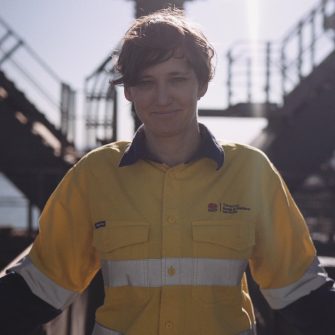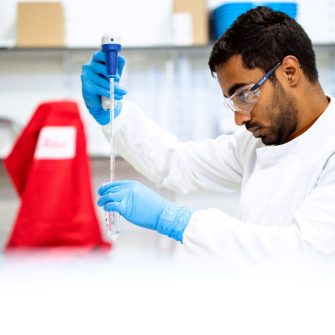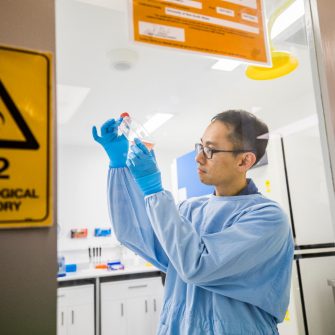Master of Mining Engineering
- Commencing Terms
- Term 1 & 3
- Duration
- 1.7 Year(s)
- Delivery Mode
- Face-to-face (includes blended)
- Campus
-
Kensington
- Codes
- Program code 8335
- CRICOS code 084284K
-
2026 Indicative first year full fee
- $45,000*
-
2026 Indicative full fee to complete degree
- $68,500*
-
2026 Indicative first year full fee
- $61,000*
-
2026 Indicative full fee to complete degree
- $94,500*

Application closures for 2026
International applications for all undergraduate programs, as well as postgraduate programs offered by the faculties of Arts, Design & Architecture, Engineering (excluding Master of Information Technology and associated programs) and Science are now closed to New Overseas Student Commencement (NOSC) for 2026 intakes.
Postgraduate programs offered by the Business School and the faculties of Law & Justice and Medicine & Health remain open. Master of Information Technology (and associated programs) also remain open.
- Overview
- Entry requirements
- What will I study?
- Future careers
- How to apply
- Fees & Scholarships
Overview
Mining engineering develops and executes the processes used to extract minerals from below and above ground. As a mining engineer you’ll work in the planning and management of engineering the extraction of mineral, petroleum and gas resources from the earth. Mining Engineers evaluate, plan and oversee the construction of a mine. They’re involved in a project through all phases of mining operations.
This degree is designed for mining engineering graduates and minerals industry professionals who want to continue their professional development. In this degree you’ll learn the fundamentals of mining engineering, mining processes, systems and analysis, and risk and safety management, as well as undertaking a research project in the mining industry. Building on your four-year undergraduate degree in mining engineering or a related discipline you’ll develop the advanced knowledge for a successful career in mining engineering.
Whether you’re interested in civil engineering, underground mining or geomechanics, you’ll advance your career in the mining industry with a Master of Mining Engineering. This course will arm you with the latest skills, trends and knowledge to get ahead.
You’ll develop your research skills by planning and executing an enquiry-based or mining industry research project or capstone project. Through this degree you’ll be able to investigate, generate and synthesise complex ideas and concepts in mining engineering. Develop a detailed understanding of the many facets of the mining industry, preparing you for your future career through practical assignments and field trips.
Key features
This 1.7-year full time (or flexible part time) degree is taught by Australia’s leading Engineering faculty. Many of the courses in this degree are offered as modules over a short block period so you can continue to work if you choose to study part time.
You'll be studying in the renowned UNSW School of Minerals and Energy Resources Engineering, providing you with industry-led professional development and world-class equipment.
Why study at UNSW?
UNSW is renowned for its’ Mineral and Mining Engineering education. We're ranked #1 in Australia and #25 globally for Engineering and Technology. As well as this, all of UNSW's Engineering schools are ranked in the global top 50 with two schools ranked in the global top 10 for Engineering subjects (QS World University Rankings by Subject, 2025).
We're known as the leading Mining Engineering school ranked #1 in Australia and #2 globally for Mineral & Mining Engineering (QS World University Rankings by Subject, 2025).
Australia’s top employers prefer our graduates over any other university. UNSW is known for its graduate employability, with UNSW awarded the Most Employable students for six years in a row (Australian Financial Review (AFR) Top100 Future Leaders Awards, 2020–2025).
We’ve offered the largest range of undergraduate and postgraduate degrees in Australia for over 70 years. We’re home to the best facilities in resources engineering in Australia. Learn with state-of-the-art facilities including a VR simulator, computer laboratory and a rock mechanics laboratory for applied research into mining issues and water research.
We place significant focus on undertaking research and educating graduates who address climate change. Our areas of focus include CO₂ sequestration; improving efficiencies through digital rock analysis; generating clean energy through geothermal engineering; and research into space mining.
Our academics are experts in their fields and internationally respected and recognised. They work alongside our industry partners and government organisations to help solve the most complex problems facing the sector. With the industry evolving at a rapid pace, we have a leadership role in teaching and research excellence.
When you study at the School of Minerals and Energy Resources Engineering you can benefit from our student societies. MERESoc is well connected with industry, offering numerous networking opportunities throughout the year. Take advantage of professional development opportunities through social events and build your professional networks while you study.
AusIMM Sydney Student Chapter is a community belonging to the Australian Institute of Mining and Metallurgy. Based in UNSW, we provide professional development opportunities for students to interact with peers and connect with mentors through technical and social activities.
Want to see more from UNSW Engineering?
Entry requirements
Entry requires a four-year (Honours) degree in Mining Engineering or a cognate discipline from a recognised institution, or satisfying the requirements of the UNSW Graduate Diploma in Mining Engineering (MINE5040FS and from 2015: MINE5335) with a minimum 70% average and no course fails.
The UNSW School of Mining Engineering defines a cognate discipline as Engineering Geology, Civil Engineering or Geotechnical Engineering. Performance that is equivalent to Honours (I or II Division 1) is required over the final two years of the degree. Professional experience in the mining industry will be highly regarded.
English language requirements
You may be asked to provide evidence of your English proficiency to study at UNSW depending on your educational background and citizenship. English language skills are vitally important for coping with lectures, tutorials, assignments and examinations - this is why UNSW requires a minimum English language competency for enrolment.
If you’re completing an Australian Year 12 qualification (e.g. NSW HSC or equivalent), you do not need to provide anything extra to prove your proficiency. Your qualification will be used as evidence of your English proficiency.
If you do need to provide evidence of your English proficiency, this will be indicated in your application. You can prove this by providing evidence that you meet one or more of the following criteria:
- English language tests and university English courses
- Prior study in the medium of English
- Other qualifications
If you need to improve your English skills before you start your degree, UNSW College’s Academic English Programs are for you. The programs are suitable for various English levels and help you prepare for university studies and life in Australia.
For more details, visit the English Language Requirements page.
Entry requires a 4 year (Honours) degree in Mining Engineering or a cognate discipline from a recognised institution, or satisfying the requirements of the UNSW Graduate Diploma in Mining Engineering (MINE5040FS and from 2015: MINE5335) with a minimum 70% average and no course fails.The UNSW School of Mining Engineering defines a cognate discipline as Engineering Geology, Civil Engineering or Geotechnical Engineering. Performance that is equivalent to Honours (I or II Division 1) is required over the final two (2) years of the degree. Professional experience in the mining industry will be highly regarded.
Admission pathways
If you do not meet the requirements for direct entry into your chosen degree, you may be eligible for a pathway program with UNSW College. UNSW College provides alternative entry options using university-approved content so that you can start your UNSW journey with confidence.
English language requirements
You may be asked to provide evidence of your English proficiency to study at UNSW depending on whether you are from an English-speaking background or non-English speaking background. English language skills are vitally important for coping with lectures, tutorials, assignments and examinations - this is why UNSW requires a minimum English language competency for enrolment.
If English is not your first language, you’ll need to provide proof of your English proficiency before you can be given an offer to study at UNSW. You can do this by providing evidence that you meet one or more of the following criteria:
- English language tests and university English courses
- Prior study in the medium of English
- Other qualifications
If you need to improve your English skills before you start your degree, UNSW College’s Academic English Programs are for you. The programs are suitable for various English levels and help you prepare for university studies and life in Australia.
For more details, visit the English Language Requirements page.
Check the specific English language requirements for this program
What will I study?
UNSW is introducing a new academic calendar from 2028.
We are moving to a new flex-semester calendar. What does this mean for your studies?
Program structure
This degree is designed to build on your foundational knowledge in mining engineering and provide you with advanced knowledge.
Full program structure
In your first year you’ll study the Fundamentals of Mining Engineering and other core subjects including:
- Mine Processes, Systems and Analysis
- Hazard Identification, Risk and Safety Management in Mining
- A Mining Industry Research Project
In this full or part time degree you’ll choose from one of the following:
- Engineering Postgraduate Coursework Research Skills - Build research skills that can be applied in industry contexts or as your first step towards Higher Degree Research (PhD) program.
- Launching a Startup - Be equipped with the skills necessary to successfully commercialise ideas.
Electives in this degree include:
- Technology Management and Innovation in Mining
- Environmental Management for the Mining Industry
- Mining Geomechanics
- Mineral Processing
- Mine Design and Feasibility
- Mine Geology and Geophysics for Mining Operations
Refer to the handbook for the full list of electives on offer, some electives may only be offered every two years.
Courses in this program may be delivered in either block mode (face-to-face or online) or offered fully online which means you can balance work and study.
Future careers
Our graduates work with advanced technologies that support clean energy and the efficient supply of mineral resources. They’re innovators, taking these new ideas and technologies into their industries and driving change.
As a graduate of mining engineering, you’ll be evaluating, planning and overseeing the construction of mines and assessing processes. This includes labour usage and equipment that’ll be required to extract minerals and ores from the earth.
Your future career awaits, with potential roles including:
Mining Engineer
Engineering Geologist
Petroleum Engineer
Geotechnical Engineer
How to apply
Applications must be submitted through our Apply Online portal. We encourage you to submit your completed application as early as possible to ensure it will be processed in time for your preferred term. Some high-demand programs and Faculties with limited places may have an earlier application deadline or commencement date. Find out more.
Ready to start your application?
For most international students, applications are submitted via our Apply Online service. We encourage you to submit your completed application as early as possible to ensure it will be processed in time for your preferred term.
Some high-demand programs with limited places, may have an earlier application deadline or may have an earlier commencement date. For details, visit the international admissions information page.
Ready to start your application?
Fees & Scholarships
*Fees are subject to annual review (or when required) by the University and may vary accordingly.
Indicative fees are a guide only and have been calculated based on the typical enrolment patterns of students undertaking the program. The indicative fees listed here is an estimate for tuition only and excludes non-tuition fees and charges. The amount you pay will vary depending on the calendar year of enrolment, the courses you select and whether your study load is more or less than 1 Equivalent Full Time Student Load (48 units of credit (UOC) per year).
You should not rely on indicative fees as fee increases are assessed when required and may exceed the indicative figures listed here. Actual fees are calculated on enrolment. More information on fees can be found at the UNSW fees website.
*Fees are subject to annual review by the University and may increase annually, with the new fees effective from the start of each calendar year. The indicative fees listed here are based on an estimated average and are for tuition only, other fees and charges are not included. The amount you pay will vary depending on the calendar year to enrol, the courses you select and whether your study load is more or less than 1 Equivalent Full Time Student Load (8 courses per year).
Indicative fees are a guide for comparison only based on current conditions and available data. You should not rely on indicative fees. More information on fees can be found at the UNSW fees website.
Indicative fees to complete the program have been calculated based on a percentage increase for every year of the program. Fee increases are assessed annually and may exceed the indicative figures listed here.
Indicative fees to complete the program include tuition plus an estimate of study-related costs of approximately $1,000 per year. To find out more about other costs, visit UNSW International.
Scholarships
At UNSW, we award over $83 million in scholarships each year. We pride ourselves on rewarding excellence and making university accessible to students from all walks of life. Whether you’re a domestic or international student, our range of scholarships, prizes and awards can support your journey.
Featured scholarship
The UNSW Women in Engineering Research Scholarship was established to assist women of high academic achievement with an interest in a research and/or an academic career in engineering. UNSW Engineering offers two Women in Engineering Top-up Scholarships every semester.
Progress starts here – at a world-leading university

Top 20 Worldwide
UNSW is ranked #20 university in the world
QS World University Rankings, 2024–2026

Most Employable Graduates
Winner of the AFR Most Employable University Award six years in a row
AFR Top100 Future Leaders Awards, 2020–2025

Australia's #1 for Innovation
Highest number of startups and spinouts from university-developed tech
SCOPR report, 2024




